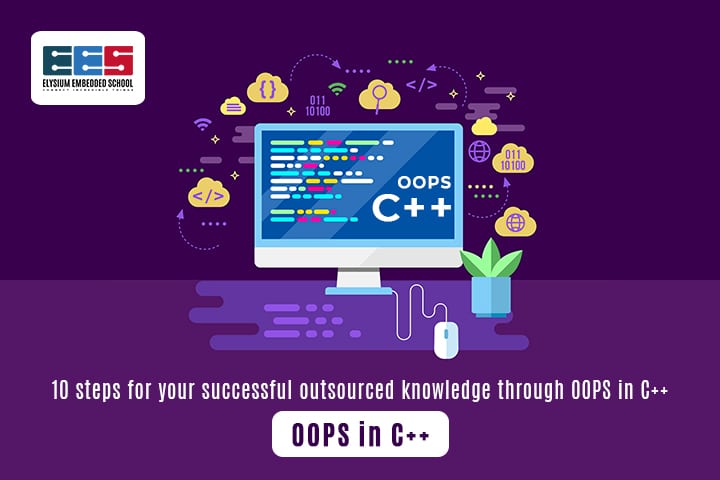
Best Technology in Embedded Systems
February 12, 2019
Real-Time Application for Microcontroller in IoT Environments
February 19, 2019Basic Concepts of OOPs in c++: OOPS Stands for Object-Oriented Programming. Here the programmers define not only the data of data structure but also the types of functions that can apply for the data structure. When it also follows the object-oriented principles. The OOPS programming vogue is built with the thought of sophistication, Objects and numerous alternative ideas like Inheritance, Polymorphism, Abstraction, Encapsulation, etc. Acquire More Knowledge with the Hands on With C++ Certification
OOPs Concepts in C++
Object-Oriented Programming is the model or a pattern that follows object-oriented principles. While the OOPs is a programming style that consorts with the concept of Class, Objects and various other ideas revolving around these two, like Inheritance, Polymorphism, Abstraction, and Encapsulation, etc. C++ was establishing as Object Oriented and general purpose language. It’s also applicable on OOPs With C++ Programming.
The OOPs Concepts in C++ are listed here, they are,
Objects: The Objects are the basic unit of OOPs Concept. Its instance and behavior of the class. The object can be a data structure, a variable or a function. It has a memory location apportion. The purpose is to describe class hierarchies.
Class: Here the Class is a Template of the method and variable in a particular kind of object. The Class is called user-defined data types, and also it contains functions. The Class is a blueprint of Object. It is defining what objects can perform services or operations.
Inheritance: Generally, the inheritance is the method or mechanism of a base class derived from another Class for a hierarchy of classes that share a set of attributes and methods. It’s the facilitate reusability and is the essential concepts of OOPs.
Polymorphism: While it is the ability to take more functions like one task can accomplish in different ways. Here the operations may exhibit, different behaviors at different instances. The instances depend upon the types of data utilize the process. Here the Parent class is referred to the child classes.
Abstraction: Here it is one of the critical concepts of oops. The primary function of the idea is to handle the complexity by hiding unnecessary details from the users and increasing efficiency. Here it can be done by using access specifies.
Encapsulation: Here the encapsulation can also be done the data binding, data variables, and functions together in class. This concept is usually wont to hide the interior illustration or state of the combing the object from the surface.
Overloading: When a significant topic in OOP is overloading methods, which lets you define the same process multiple times. So, you can call them with different argument lists. You can decide the space with either one or two arguments.
Exception Handling: Since the handling, the mechanism can catch a whole class of exceptions and not a particular error. It can be applied while the defense is caught. In OOPs it is advised to use exceptions, error in managing situation or unexpected events which arrays during a program execution.
Interface: It is the OOPs languages that interface a programming structure or syntax which allows the computer to enforce specific properties on an object. It also implements the abstractions.
Access Modifiers: Access Modifiers are keywords in a OOPs language that set the accessibility of classes, methods and other members. It is the square measure that a particular part of artificial language syntax familiar to facilitate the encapsulation of elements.
Here, Those Concepts are the major outsource functions of OOPs Language. It empowers the students to learn OOPs without disclosing them to the complexity of OOPs with C++. It provides the kind of dogmatic compile-time and error checking typically compares with Pascal.










